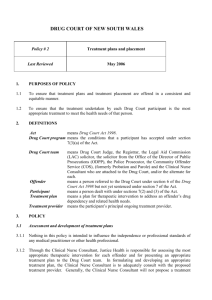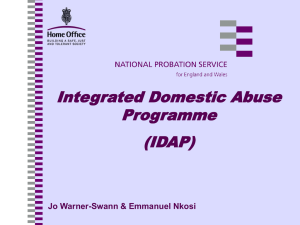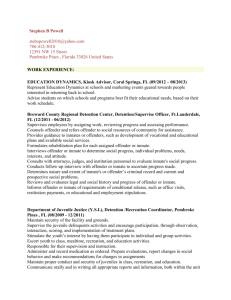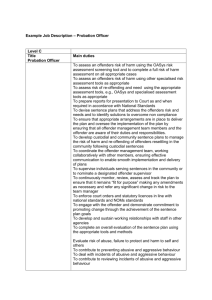Traffic Offender Programs Operating Guidelines
advertisement
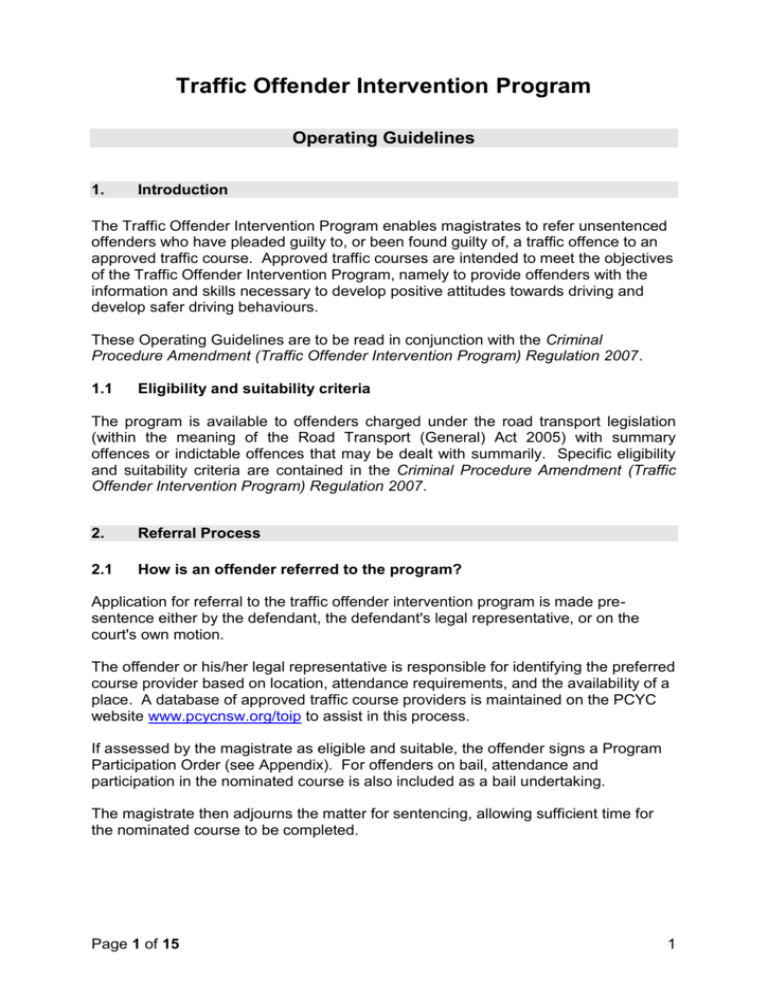
Traffic Offender Intervention Program Operating Guidelines 1. Introduction The Traffic Offender Intervention Program enables magistrates to refer unsentenced offenders who have pleaded guilty to, or been found guilty of, a traffic offence to an approved traffic course. Approved traffic courses are intended to meet the objectives of the Traffic Offender Intervention Program, namely to provide offenders with the information and skills necessary to develop positive attitudes towards driving and develop safer driving behaviours. These Operating Guidelines are to be read in conjunction with the Criminal Procedure Amendment (Traffic Offender Intervention Program) Regulation 2007. 1.1 Eligibility and suitability criteria The program is available to offenders charged under the road transport legislation (within the meaning of the Road Transport (General) Act 2005) with summary offences or indictable offences that may be dealt with summarily. Specific eligibility and suitability criteria are contained in the Criminal Procedure Amendment (Traffic Offender Intervention Program) Regulation 2007. 2. Referral Process 2.1 How is an offender referred to the program? Application for referral to the traffic offender intervention program is made presentence either by the defendant, the defendant's legal representative, or on the court's own motion. The offender or his/her legal representative is responsible for identifying the preferred course provider based on location, attendance requirements, and the availability of a place. A database of approved traffic course providers is maintained on the PCYC website www.pcycnsw.org/toip to assist in this process. If assessed by the magistrate as eligible and suitable, the offender signs a Program Participation Order (see Appendix). For offenders on bail, attendance and participation in the nominated course is also included as a bail undertaking. The magistrate then adjourns the matter for sentencing, allowing sufficient time for the nominated course to be completed. Page 1 of 15 1 2.2 How is the approved traffic course provider notified about the identity of the offender? Following the magistrate’s referral to the nominated course, the offender, or his/her legal representative, is responsible for confirming the time and date of attendance and the address of the course. At the same time or shortly thereafter, the Court will fax a copy of the Program Participation Order to the nominated course provider. The Program Participation Order will contain the offender’s signature that can be checked against his/her signature on attendance. It is recommended that course providers also require the offender to produce photo identification where possible, such as a driver’s licence, passport or other photo ID. 2.3 Conditions of participation in the specified traffic course The Program Participation Order (see Appendix) includes a generic set of conditions for participation in an approved traffic course. Individual course providers may require participants to adhere to further conditions. In particular, prior to commencement, participants should be notified about attendance and assessment standards required to complete the course. 3. Approved Traffic Course Requirements (Minimum standards) 3.1 Record keeping 3.1.1 Required information The approved traffic course provider must keep records containing the following information: Name, address and date of birth of the offender Details of ID used to identify the offender The nature of the offence(s) The extent to which the offender has complied with the requirements of the course (including attendance and assessment) A copy of the Program Participation Order Any fees or other moneys paid by the offender to the course provider in relation to the course 3.1.2 Access to information Records relating to the offender and the offender’s participation in the program must be held securely, either as hardcopies in a lockable cabinet or as electronic copies on a password protected computer. Staff are to treat participant records as confidential. Page 2 of 15 2 Representatives from the New South Wales Department of Justice are to be given access to or copies of course records provided reasonable notice has been given to the approved course provider. 3.1.3 Reports back to court Approved course providers must report back to the court on the offender’s participation in the course using the court report format included in the Appendix. Course providers are to indicate in the report which of the following scenarios occurred: Offender attended satisfactorily Offender attended some sessions but failed to achieve satisfactory attendance Offender failed to attend any sessions Offender withdrew voluntarily without attending Offender withdrew voluntarily after partial attendance Offender was expelled from program If the participant attends satisfactorily, the court must receive the report within 5 working days of the date on which the offender is due to reappear in court. If the participant’s attendance is unsatisfactory, course providers are to complete and return the report back to court at the point where there is insufficient time left in the course for the participant to achieve a satisfactory attendance level. If the participant is expelled from the course, course providers are to complete and return the report back to court as soon as the expulsion is effected. If the participant withdraws voluntarily, course providers are to complete and return the report back to court immediately upon receiving notification of the withdrawal from the participant. 3.1.4 Annual reports Approved course providers are required to submit an annual report. The report will detail activity for the calendar year 1 January to 31 December and is to be sent to the Crime Prevention Division no later than 31 March of the following year. The annual report is to include the following information relating to the calendar year: Number of participants Breakdown of participants by completion/non-completion, reason for noncompletion, referring Local Court, offence(s), age, gender, ATSI status and culturally/linguistically diverse background. A copy of the annual report format is included in the Appendix. Page 3 of 15 3 3.2 Course Content 3.2.1 What topics are to be covered during the course? Course content must further the Traffic Offender Intervention Program objectives by including the following measures: a) Measures that aim to improve the understanding of course participants of their legal obligations as road users b) Measures that aim to develop safe driving behaviour by course participants c) Measures that inform course participants about the potential impact of traffic offences on the victims of such offences and on the community generally. The following are suggested, though not exclusive, topic areas to be covered during the course: 3.3 Road safety Drinking/drug taking and driving Perspective from Ambulance workers, representative Alcohol and other drug education Legal consequences of traffic offences Impact of traffic offences Maintenance of safe vehicles Police, Insurance industry Course delivery 3.3.1 Course and session length To satisfactorily cover the required topic areas an approved traffic course should contain a minimum of six individual sessions and a maximum of 10. Sessions should run for a minimum of 60 minutes and a maximum of 120 minutes. 3.3.2 Class size There is no maximum class size. However, it is recommended that the number of participants in each session should not exceed 30. 3.3.3 Venue facilities Venue facilities must comply with Occupation Health and Safety guidelines. Specifically, they should include the following: Toilet Disabled access Fire exits Page 4 of 15 4 3.3.4 Dealing with alcohol or other drug affected participants Approved course providers are to have a procedure in place to deal with participants who attend visibly affected by alcohol or other drugs. The incident is to be noted on their records. The course provider may expel the offender from the course. If this occurs the course provider must inform the court of this decision. 3.4 Complaints procedure Course providers are to have in place a complaints procedure and are to document and file any complaints raised by the participant in regard to the following: Attendance Access to venue Exclusion due to behaviour/intoxication Completion of assessment tasks Payment of fees Where complaints cannot be resolved at a local level, the complainants should be informed that they can raise their complaint with the Director, Crime Prevention Division. 3.5 Fee structure The fee charged for a course must be on a cost recovery basis and not for profit. 3.6 Identified educational supervisor Course providers are to nominate an identified educational supervisor and provide details of their qualifications, employment history, appropriate teaching qualification and experience. 4. Approval Process 4.1 How does a traffic course provider apply to become an approved traffic course provider? In order to become approved, course providers must complete the Traffic Offender Intervention Program Application for Approval form and send it, along with supporting documentation, to: Crime Prevention Division New South Wales Department of Justice GPO Box 6 Sydney NSW 2001 A copy of the Approval for Application Form is included in the Appendix. Page 5 of 15 5 4.2 How does New South Wales Department of Justice decide who becomes an approved course provider? The Crime Prevention Division, New South Wales Department of Justice, will convene an Application Review Committee, including representatives from the Roads and Maritime Services and Local Courts, to review applications for approval and make recommendations to the Director General of the New South Wales Department of Justice. The involvement of the RMS and Local Courts administration ensures the committee has sufficient expertise to review applications and that the process is as transparent as possible. Applications can be received at any time and the review committee convened on an “as needed” basis. In the event the committee assesses an application as unsatisfactory in one or more categories, the applicant will be advised and given the opportunity to resubmit their application. There is no limit to the number of times a course provider can submit an application for approval. If an applicant disagrees with the decision of the Application Review Committee an appeal can be made in writing to the Director, Crime Prevention Division, Department of Justice. If that appeal is unsuccessful, a further appeal can be made to the Director General of the Department of Justice. Finally, an appeal can be made to the Administrative Decisions Tribunal. Prior to making its recommendation to the Director General, the Committee assesses applications based on information provided in the Traffic Offender Intervention Program Application for Approval form. The information requested falls into the following categories: 4.2.1 Course provider details This section requires applicants to supply the following information in relation to their agency: Name of the course provider Contact details (postal and street address, phone and fax number, email address) Brief history of course provider, evidence of incorporation and organisational structure. Educational supervisor’s qualifications and experience Generic information on course presenters (that is, position/qualifications/experience required of presenters, rather than details of individual presenters) 4.2.2 Course Content This section requires applicants to supply the following information in relation to course content and delivery: Objectives of the course Outline of course content Samples of materials used in course (handouts, videos) Page 6 of 15 6 Assessment criteria for the course, including the minimum rate of attendance required of course participants Proposed monitoring and evaluation mechanisms for the course 4.2.3 Course administration and venue facilities This section requires applicants to provide the following information in relation to the administration of the course and venue facilities: Copy of all traffic offender forms under agency letterhead (registration and attendance forms, completion certificate, assessment questionnaires, program evaluation forms, release of information forms, complaints procedure form) Information security (storage of participant records) Venue facilities satisfying Occupational Health and Safety standards. Staff development activities 4.2.4 Fee structure This section requires applicants to detail their fee structure if applicable. 4.3 How often must approval be renewed? Approved traffic course providers are required to resubmit an application for renewal of approval every three years from the date of their approval by the Director General. 4.4 How are legal representatives provided with an up-to-date list of approved traffic course providers? The list of approved traffic course providers is maintained on the PCYC New South Wales website www.pcycnsw.org/toip. 4.5 How is the quality of traffic course provision maintained during the three years approval is given for? The New South Wales Department of Justice reserves the right to request information from or visit an approved traffic course provider to ensure that the minimum standards for approval are being maintained. Representatives of the Department will give reasonable notice before visiting an approved traffic course provider. Approval will be withdrawn from providers whose standards fall below minimum requirements and their names will be removed from the list of approved traffic course providers utilised by the Local Courts. 4.6 What are the notification requirements for providers who want to vary their program/venue/personnel? Approved traffic course providers who wish to vary aspects of their course delivery that are relevant to the criteria to be met for approval must notify the New South Wales Department of Justice in writing. Page 7 of 15 7 This does not include changes in personnel, but would include changes in the qualifications/experience a course provider requires from their personnel, changes in contact details, course content and venue. Appendix Forms 1. 2. 3. 4. Program Participation Order Report back to court Annual report format Application to become approved program provider Page 8 of 15 8 APPENDIX – Forms 1. Program Participation order Referring Court: Court to be reported back to: Date report required by: Participant’s Name: Date of birth: Address: Telephone number: Offence(s): Course provider: Course address: Scheduled start date: Conditions: I agree to attend the above-mentioned course at the above address on the scheduled start date. I agree to take with me to each course session the following: Program Participation Order Photo identification Pen and notebook I agree to attend punctually for each session and in accordance with the requirements of the course provider I agree to complete any assessment tasks set by the course provider I understand that if I fail to attend, the court will be informed and I may be returned to court for sentence determination I understand that if I attend the course under the influence of alcohol or drugs I may be expelled from the course and returned to court for sentence determination I agree to abide by the standards of behaviour that the course provider requires and understand that if I don’t I may be expelled from the course and returned to court for sentence determination Signed: Date: Page 9 of 15 Witnessed by: 9 2. Report back to court format [Course provider’s letterhead] [Course provider’s contact details] Report to Court Local Court: Court adjournment date: Participant’s Name: Date of birth: Address: Referring Court: Offence(s): Course start date: Course finish date: Attendance record (please circle below): Satisfactory Attendance - Unsatisfactory but partial attendance Nil Attendance Withdrew voluntarily (without attending) Withdrew voluntarily (after partial attendance) Expelled from course Assessment tasks: (please indicate participant’s performance on assessment tasks) General comments: (please comment as necessary on attendance, participation in class activities, discussions etc.) Signed: Date: Page 10 of 15 10 3. Annual Report Format Service Provider: Reporting period: 1 Jan to 31 December Number of Participants: Number Completers Non-completers Not known Total no. of participants Reason for non-completion Number Withdrawn Failure to attend Expelled due to inappropriate behaviour Other Total Local Court making the order: Number LC A LC B LC C LC D LC ... Not known Total Offence(s): Number PCA Low range PCA Mid-range PCA High range PCA Special range PCA PCA range not known Sub-Total PCA Speeding 0-15 kph 15-30 kph 30-45 kph > 45 kph Sub-Total Speeding Drive whilst unlicensed Drive whilst disqualified Page 11 of 15 11 Negligent driving Dangerous driving Other Not known Total *Multiple offences should be indicated so “Total” for this section will not agree with total number of participants. Age: Number < 18 18-19 20-24 25-29 30-34 35-39 40-44 45-49 50-54 55-59 60-64 65-69 70-74 75-79 >80 Not Known Total Gender: Number Male Female Not known Total ATSI: Number ATSI Non ATSI Not known Total Culturally/linguistically diverse background: Number Yes No Not known Total Page 12 of 15 12 Participant fees: Amount Standard rate Discount rate (if applicable) Total participant fees collected during reporting period 4. Application for Approval 1. Course provider details Course provider name: Type of agency: Manager/coordinator’s name: Postal address: Address of primary premises (if different from postal address): Telephone number: Email: Fax: 2. Checklist for required documentation. Please provide the following documentation: A. Course provider and personnel Course provider Brief history of the course provider Organisational structure and lines of accountability Evidence of incorporation Service delivery locations List of addresses for all venues for which approval is sought Educational supervisor Copies of qualifications, employment history, appropriate teaching qualification and experience of the nominated educational supervisor Course presenters Qualifications and experience the course provider requires from its presenters Page 13 of 15 13 B. Course Content Course delivery Goals and objectives for the program (measurable and attainable) Curriculum content Educational materials Copies of client manual and/or handouts to be used Copy of course outline and objectives and topic summaries in other languages, if available Other materials, including videos Strategy for keeping materials up to date Assessment criteria Assessment criteria for individual subjects Minimum rate of attenda C. Administration and facilities Administration and documentation Copy of all traffic course forms under course provider letterhead. These may include: 1. Registration and attendance forms 2. Participation agreement 3. Completion certificate 4. Program evaluation/appraisal form 5. Complaints procedure Fee Structure (if applicable) Standard rate Discount rate Other rates Information security Demonstrated understanding of privacy principles in relation to client personal information and files. Details of secure storage for client files Details of policy relating to access to client files Venue facilities Outline of facilities and resources available at each venue. Complaints procedure Outline of course provider’s complaints procedure Professional Development Demonstrated commitment to participating in professional development activities Page 14 of 15 14 D. Undertaking This course provider agrees to abide by the standards and guidelines set out in the Traffic Offender Intervention Programs Guidelines and to allow New South Wales Department of Justice representatives to visit the course provider’s premises, interview the Educational Supervisor, view files, review paperwork and observe educational sessions in order to monitor compliance. Any variation from the standards and guidelines shall be requested by the course provider in writing and approved by the New South Wales Department of Justice in writing before implementation. Signed: Name: Position: Date: Page 15 of 15 15

